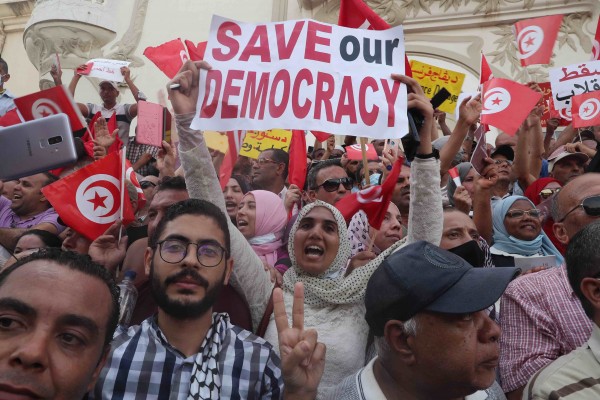The International Press Institute (IPI) announced on Monday that Tunisian online broadcaster and news website Radio Kalima is the recipient of the IPI Free Media Pioneer Award 2011.
The annual award, given out every year at the Vienna-based press freedom organisation’s World Congress, honours media or organisations that have fought to ensure freer and more independent media in their country.
“We feel honored and proud to receive this award from the International Press Institute,” said Omar Mestiri, Director of Radio Kalima. “The Tunisian revolution was the biggest recognition of our fight for liberty. The people spoke loud all together and fired the dictator. But we are aware that the fight is not in its end, the counterrevolutionary lobby is still powerful and very active. We are still struggling to spread the people’s voice, to spread the word, to spread Kalima.”
Radio Kalima was founded by prominent journalists Naziha Razjib and Sihem Bensadrine in 2000. It quickly became a target for repeated harassment by the authorities, and was banned in Tunisia.
Under former President Zine El Abidine Ben Ali, the station was forced to resort to broadcasting clandestinely. Members of Radio Kalima faced continual surveillance and threats while in the country, were prevented from meeting other journalists, activists or opposition members, and were at various points detained, attacked, and subjected to criminal charges.
In 2009, authorities raided the offices of Radio Kalima, accusing them of broadcasting using illegal frequencies, after the media outlet began broadcasting on satellite as well as on the web.
“For us, [this] is obviously a way to silence this radio. I say, it’s a fight against the future and the future is not with them. They can control all things on the land. They cannot control the sky, and for this reason they are reacting like this. We will continue broadcasting on satellite even after what happened today, and Radio Kalima will never be silenced,” Bensedrine told IPI at the time.
The 2009 attack was only one of several against the radio station, and personal attacks against the staff. In 2008, Bensedrine and her husband and director of the station Omar Mestiri, were seized by customs officers at the port in the northern suburbs of Tunis and held for six hours, during which time they were physically assaulted by the political police. They were also subjected to a thorough body search and police seized and copied the hard discs from their laptop computers. Radio Kalima’s correspondents were repeatedly fined, harassed, beaten, and arrested by the authorities.
In the face of adversity, however, Radio Kalima’s commitment to independent reporting remained unflinching. The staff resorted to Skype and other online tools to file stories and hold editorial meetings, working under constant threat. The call-in programs on the station made them popular among a wide audience, and an important source of information for Tunisians, whose country is now going through a significant transition following popular protests that began in December 2010, and culminated in the ouster of former President Ben Ali.
Journalists from Radio Kalima were caught in the frontline as the government clamped down on free expression as a way to stifle the uprising. In December 2010, a journalist from the station was viciously beaten to prevent him covering a public gathering. His injuries put him in intensive care. According to Reporters without Borders, Moez Jemai, Radio Kalima’s correspondent in Gabes (400 km south of Tunis), was arrested by four plainclothes policemen on 6 January. He was sprayed with a disabling gas, pushed into an unmarked car and driven to the interior ministry in Tunis, where he was mistreated during interrogation about his coverage of protests. Another correspondent, Nissar Ben Hassen, arrested at home on 11 January while editing film of unrest in Chebba. Ben Hassen was released on 14 January, along with another journalist, as part of the former President’s purported new commitment to “complete freedom of expression.”
Although the protests led to the ouster of President Ben Ali, Radio Kalima’s struggle is far from over. “The old security guard is still active, ”removing” people and trying to shake up the peace and order and security of public life. The media in Tunisia urgently needs international protection and international presence, as well as equipment and training,” Bensedrine told the International Media Support (IMS) in Janury 2011.
On 21 June, Mestiri began a hunger strike demanding that Radio Kalima be granted a license to operate.
A week later, on 29 June, the newly formed national panel supervising the reform of news and communication (INRIC), said the body had recommended to the prime minister’s office that licences be granted to 12 private radio stations, including Radio Kalima.
“Radio Kalima’s undaunted commitment to independent reporting in the face of all odds has been an inspiration for all of us, and for media around the world”, said IPI Director Alison Bethel McKenzie, announcing the award. “There are still many questions surrounding the state of the media in Tunisia, and many steps to be taken. This award is an expression of our support, and the support of our network of members around the world, for Radio Kalima, and for independent media in Tunisia.”
The award will be handed over at the IPI World Congress 2011 in Taipei, Taiwan, 24-27 September. Please visit the congress website for more information or to register.


